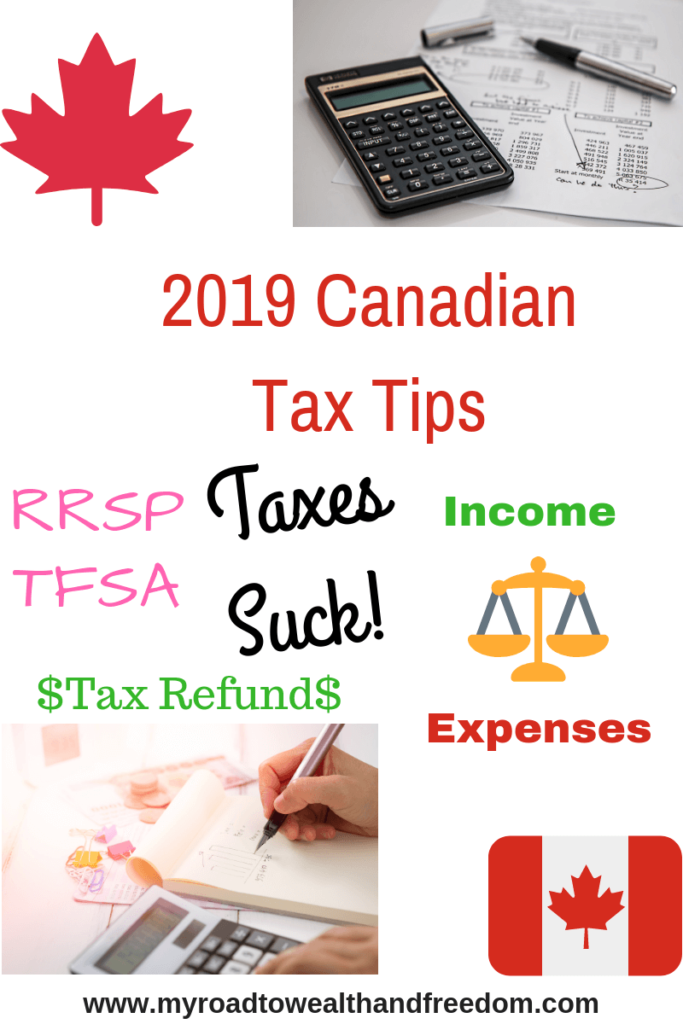
This post on 2019 Canadian Tax Tips is designed to get you the best possible tax refund. What you’ll read below are some things that my family does to earn the maximum refund possible by being tax smart. Just a quick disclaimer note, I’m not a tax accountant so please seek professional advice before following any of these tips. Also, this post contains affiliate links. As an affiliate of Questrade and Turbo Tax, this blog receives a small commission for each sign up.
Like everyone else, I hate taxes. Even more so when I realize just how much money we actually pay in taxes. This leads me to question – as all taxpayers should – where does all my tax dollars go…The answer enrages me so I won’t go into my critique on how governments of all political persuasions spend OUR MONEY! Suffice it to say that there’s so much wasteful spending that the Canadian Taxpayers Federation (CTF) runs an annual Teddy Awards on Government Waste. Check it out on Taxpayer.com.
Anyway, when it comes to taxes, nobody but the government wins so in this post I’ll try to navigate you guys through some ways to limit the damage to your finances.
Now I want to be clear. These are accepted, legitimate ways to lower your annual tax bill. Never, ever, ever cheat on your taxes. The CRA is not just a bunch of accounting geeks; they have extraordinary powers and there are lots of horror stories about taxpayers who found themselves in the crosshairs of the CRA.
So keep your taxes honest people and here are some the best tax tips for Canadians:
2019 Canadian Tax Tips :

#1 File a Tax Return
As much as I hate taxes, it’s really important that everyone files a return. I’m surprised that I actually need to say this but many people, especially lower income households, don’t bother to file a tax return at all. And that is a big mistake because even if you feel like you don’t earn enough, there are tons of benefits that you or your family may be entitled to. There are lots of free tax software programs out there that make filing your taxes really simple and painless. So please do yourself a favor and file a tax return.
I use TurboTax and have for years. I’ve used various versions of TurboTax, including the free version for my mother in-law. They work great and I highly recommend it.
Click Here to Purchase TurboTax Canada
#2 Save Your Receipts
Child care expenses, medical expenses, education expenses, moving expenses, business expenses etc. We all have tons of expenses and some of these can save you money at tax time. So save your receipts. I have a big yellow envelope that I use to collect receipts throughout the year so that they’re ready come tax time.
#3 Don’t Pay Too Much Tax
Most Canadians are excited about getting a big fat tax refund, but keep in mind they just gave the government an interest free loan for nearly a year and a half. Try and see if Revenue Canada (CRA) will give you the same deal if you need to pay them!
A small tax refund is acceptable. But if you’re regularly getting big fat tax refunds (in the thousands of dollars) then you need to fill out paperwork to limit the amount of withholding tax on your paycheques and start investing that money for the future. The form you need is called a T1213 and you can access it through this link on the CRA website. You must fill it out each year, have it approved by the CRA, and then you can give it to your employer.
#4 Contribute to an RRSP
In Canada, a big part of tax season is the mad rush to make last minute RRSP contributions to get a tax reduction and that coveted tax refund cheque. To find out how much you can contribute to your RRSP, check your Notice of Assessment from last year’s tax filing.
Make your RRSP contribution Before March 1st to get the tax refund. Rather than rushing to find some cash to make an RRSP contribution at tax time, consider making regular contributions throughout the year. By setting up automatic savings into your RRSP you could save much more than you would have otherwise and your money will grow faster over time.
Oh and relax you don’t need to make a huge commitment of hundreds of dollars. You can start with as little as $25 and buy ETFs for free at Questrade. If an online broker like Questrade is not your cup of tea then consider any bank out there. Everyone has automatic savings plans starting at $25 a month, a week or a year – your choice.
Over time you’ll hardly notice this $25 going into your RRSP and that could motivate you to do more. You could even start automating $25 a month going into your TFSA, or a high interest savings account. The possibilities are endless and over time your fortune will grow.
I know that most people are afraid of making financial commitments when it comes to saving their money, but they have no problem throwing it away on monthly payments for all sorts of things (how many people made the hit the gym resolution this year?).
Related Questrade Review
#5 Taxes and the Tax Free Savings Account
You do not get a tax deduction if you put money into a TFSA. However, the Tax Free Savings Account is a great way to shelter investments from the tax man. Whether you receive monthly interest, dividends from stocks or capital gains from selling stocks at a profit, you don’t need to claim any of it as income.
Most TFSAs are under used compared to other kinds of savings accounts. For example, some people have workplace savings plans where they save a little bit of money off of each paycheque. These are typically non-registered, fully taxed accounts so why not move money from there to a TFSA. This is what I do with my own workplace group savings plan. Each year, I move money out of this (and my other taxable accounts) and into my TFSA at Questrade. By doing so, I won’t be taxed on any interest, dividends or capital gains that I earn.
Related Become a TFSA Millionaire
#6 Taxes and Investments in Canada
For the vast majority of Canadians, investing simply means putting money into a Tax Free Savings Account (TFSA) or an RRSP. But there are lots of other investment options open to people outside of the TFSA and RRSP tax shelters that have tax consequences.
Related 6 Ways to Build Tax Efficient Wealth
Rental Property and Taxes
One of the things that I like about rental properties is that they come with tons of tax advantages. If you have rental income, you’re only taxed on the profits, which is the amount of rental income received minus all the expenses of running the property. Things like mortgage interest, property taxes, utilities, maintenance etc., are all expenses that you can claim.
Those expenses can be used to reduce the amount of income tax owed. If you had a few months of vacancy and have “lost” money, then that loss can be used to reduce the amount of your overall taxable income. Like I said, there are tons of tax advantages for property investors, which is why so many people choose rental property as an additional investment to stocks and bonds.
Related Tax Advantages For Rental Properties
Tax on Interest in a Savings Account
Any interest earned outside of an RRSP or TFSA is fully taxable. That includes interest earned in a High Interest Savings Account. Most people have a rule of thumb that if it’s not reported on a tax slip then it doesn’t have to be claimed. For the record, the CRA states that all income from all sources must be reported regardless of whether or not a tax slip was issued. So to play it safe, every penny of interest received in a chequing or savings account should be reported.
Related Best High Interest Savings Accounts in Canada
Tax on Dividends from Stocks, Mutual Funds or Exchange Traded Funds (ETFs)
This is all taxable income that should be reported on a T5 or T3 slip from your broker. Depending on the province, dividends are taxed around 30%.
Tax on Capital Gains
When you buy a stock and then sell it for more money than what you paid, you have to report what’s called a Capital Gain to the CRA. Capital Gains are the best type of investment income for tax purposes because you end up keeping about 50%-70% of the money you made. It works like this: half the amount is yours to keep free and clear, while the other half gets added to your total taxable income and is taxed at your marginal rate.
Preparing and filing annual income tax returns is definitely not my idea of fun but I hope some of these tips can help save you money. Thanks for reading this post on 2019 Canadian Tax Tips.
Very interesting to see the differences in taxing in different countries. It seems quite similar to ours here in Australia. Thanks for sharing.
The cool thing about Canada is that we have a tax-free savings account where we can put money in (up to a limit) and it any interest, dividends or capital gains are completely tax free. Unlike the US Roth IRA, we can take our money out before we retire. The TFSA is really versatile and gives us a big advantage if we use it to build long term wealth.
Do you have anything like that in Australia?
Cheers!